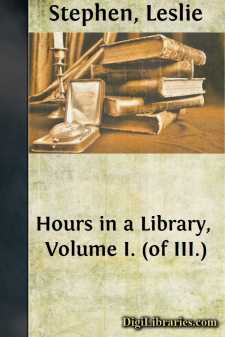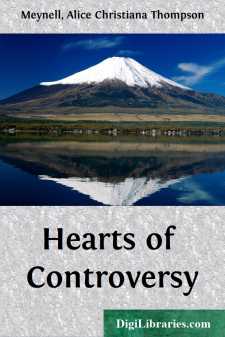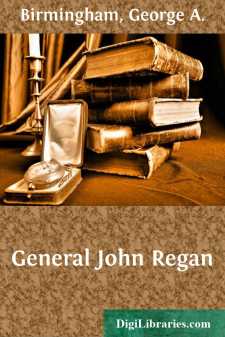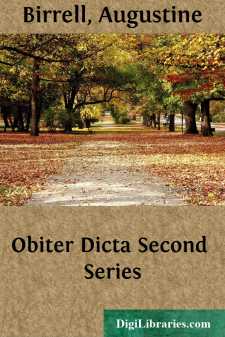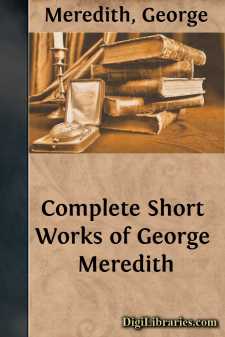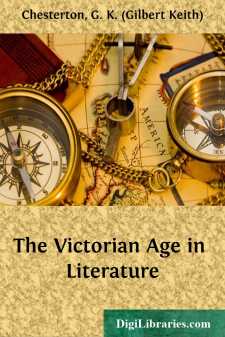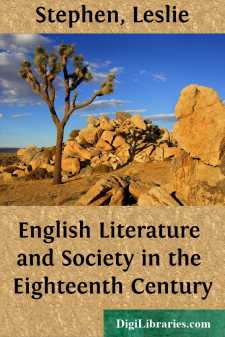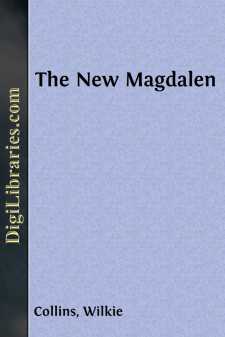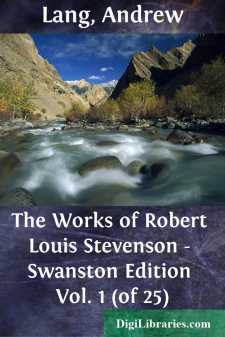Literary Collections
- American 84
- Ancient, Classical & Medieval 14
- Asian 1
- Australian & Oceanian 1
- Canadian 55
- Continental European 121
- English, Irish, Scottish, Welsh
- Essays 160
- General 24
- Letters 46
- Middle Eastern 1
English, Irish, Scottish, Welsh Books
Sort by:
by:
Leslie Stephen
OPINIONS OF AUTHORS Libraries are as the shrines where all the relics of the ancient saints, full of true virtue, and that without delusion or imposture, are preserved and reposed.—Bacon, Advancement of Learning. We visit at the shrine, drink in some measure of the inspiration, and cannot easily breathe in other air less pure, accustomed to immortal fruits.—Hazlitt's Plain Speaker. What a...
more...
SOME THOUGHTS OF A READER OF TENNYSON Fifty years after Tennyson’s birth he was saluted a great poet by that unanimous acclamation which includes mere clamour. Fifty further years, and his centenary was marked by a new detraction. It is sometimes difficult to distinguish the obscure but not unmajestic law of change from the sorry custom of reaction. Change hastes not and rests not, reaction...
more...
CHAPTER I The Irish police barrack is invariably clean, occasionally picturesque, but it is never comfortable. The living-room, in which the men spend their spare time, is furnished with rigid simplicity. There is a table, sometimes two tables, but they have iron legs. There are benches to sit on, very narrow, and these also have iron legs. Iron is, of course, harder than wood. Men who are forced to...
more...
I am sorry not to have been able to persuade my old friend, George Radford, who wrote the paper on ‘Falstaff’ in the former volume, to contribute anything to the second series of Obiter Dicta. In order to enjoy the pleasure of reading your own books over and over again, it is essential that they should be written either wholly or in part by somebody else. Critics will probably be found ready to...
more...
by:
George Meredith
THE WHITE ROSE CLUB In those lusty ages when the Kaisers lifted high the golden goblet of Aachen, and drank, elbow upward, the green-eyed wine of old romance, there lived, a bow-shot from the bones of the Eleven Thousand Virgins and the Three Holy Kings, a prosperous Rhinelander, by name Gottlieb Groschen, or, as it was sometimes ennobled, Gottlieb von Groschen; than whom no wealthier merchant bartered...
more...
Part 1—Chapter I. Like most other Children, who should be my Godfather is decided by Mammon—So precocious as to make some Noise in the World, and be hung a few days after I was born—Cut down in Time, and produce a Scene of Bloodshed—My early Propensities fully developed by the Choice of my Profession. Those who may be pleased to honour these pages with a perusal, will not be detained with a...
more...
INTRODUCTION A section of a long and splendid literature can be most conveniently treated in one of two ways. It can be divided as one cuts a currant cake or a Gruyère cheese, taking the currants (or the holes) as they come. Or it can be divided as one cuts wood—along the grain: if one thinks that there is a grain. But the two are never the same: the names never come in the same order in actual time...
more...
by:
Leslie Stephen
When I was honoured by the invitation to deliver this course of lectures, I did not accept without some hesitation. I am not qualified to speak with authority upon such subjects as have been treated by my predecessors—the course of political events or the growth of legal institutions. My attention has been chiefly paid to the history of literature, and it might be doubtful whether that study is...
more...
by:
Wilkie Collins
FIRST SCENE.—The Cottage on the Frontier.PREAMBLE.THE place is France. The time is autumn, in the year eighteen hundred and seventy—the year of the war between France and Germany. The persons are, Captain Arnault, of the French army; Surgeon Surville, of the French ambulance; Surgeon Wetzel, of the German army; Mercy Merrick, attached as nurse to the French ambulance; and Grace Roseberry, a...
more...
by:
Andrew Lang
So much has been written on R. L. Stevenson, as a boy, a man, and a man of letters, so much has been written both by himself and others, that I can hope to add nothing essential to the world's knowledge of his character and appreciation of his genius. What is essential has been said, once for all, by Sir Sidney Colvin in "Notes and Introductions" to R. L. S.'s "Letters to His...
more...


